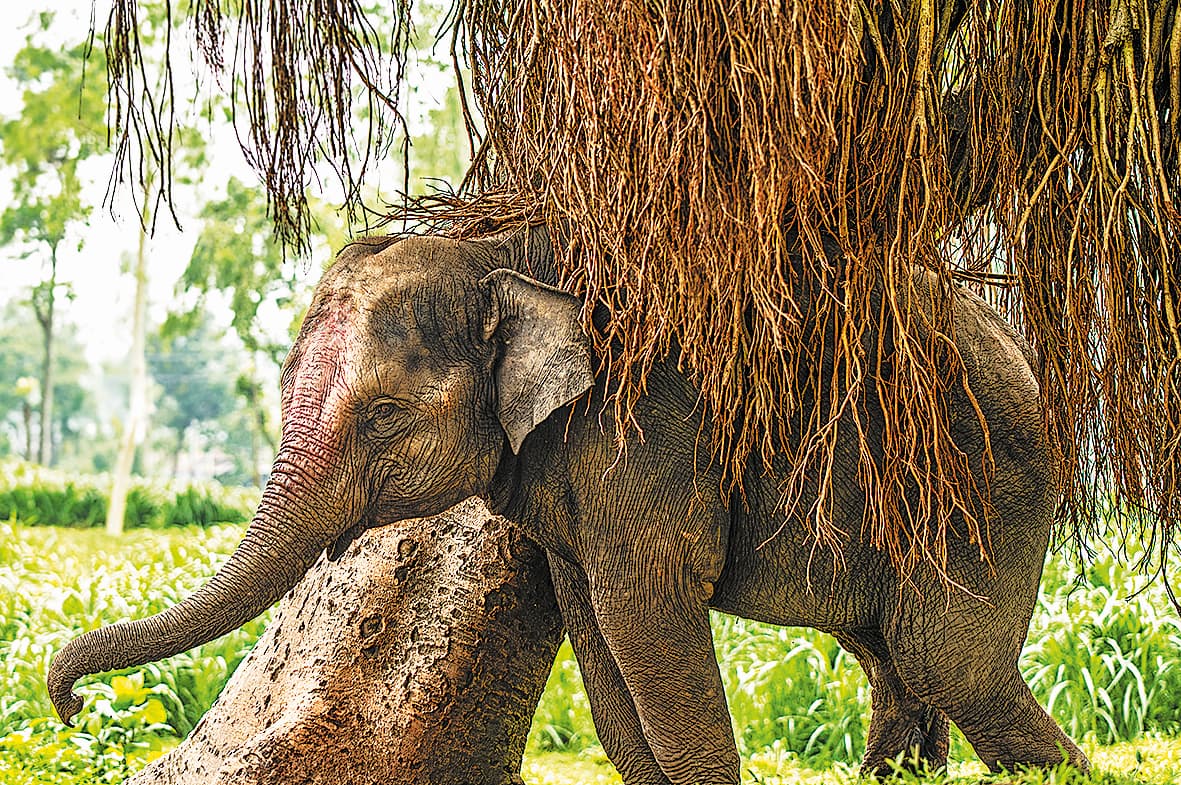Close calls
Bangladesh's gentle giants are in peril
Updated: 2025-03-13 10:36

Editor's note: In this weekly feature China Daily gives voice to Asia and its people. The stories presented come mainly from the Asia News Network (ANN), of which China Daily is among its 20 leading titles.
Over the past decade, nearly half of the country's wild elephant population has been wiped out.
These gentle giants, which once roamed freely across Bangladesh's lush forests, have been falling victim to human-elephant conflict, driven by relentless deforestation and habitat loss.
In the last 10 years, at least 124 wild elephants were killed across Cox's Bazar, Chattogram, the Chittagong Hill Tracts, and Mymensingh regions. Many fell prey to retaliatory killings, electrocution, poaching, and train accidents.
Conversely, 83 people have been killed in elephant encounters during this period. Yet, the government's response has been limited, with few visible actions to prevent further losses.
According to a 2016 survey by the International Union for Conservation of Nature, or IUCN, there were only 457 elephants in the country, including 268 wild elephants, 93 migratory elephants, and 96 in captivity.
The study found that from 2003 to 2015, 63 wild elephants were killed, clearly indicating the rate of elephant killings has doubled in the last decade.
However, it was not determined how many of the recorded deaths involved migratory elephants.
Meanwhile, a circus elephant died in Lalmonirhat in 2019 due to extreme stress, while a captive elephant calf was killed after being hit by a train in Uttara, Dhaka, in 2023.
With Bangladesh's forests disappearing at an alarming rate, conservationists fear these magnificent creatures may soon vanish from the country altogether.
According to data from the Wildlife Management and Nature Conservation Division under the forest department, at least 102 wild elephants were killed in the Chattogram region alone in the past decade, from 2016 to January this year.
Data obtained by The Daily Star showed that 16 died from electrocution, while five were shot dead. The Wildlife Division reported that 53 elephants died from age-related complications or "natural causes" such as heart failure. At least 17 died from accidents, while the causes of the remaining deaths could not be determined.
During this period, 44 people died in human-elephant conflicts in the region.
Human intervention
Conservationists, however, argue that all the elephant deaths resulted from human intervention.
Despite the scale of the crisis, only 18 cases have been filed over the killing of elephants.
One such incident involved Ali Akbar, a 36-year-old welder from Chattogram's Karnaphuli upazila. An upazila is an administrative region in Bangladesh, and it is made up of a few villages.
One night, upon stepping out of his home, he encountered an elephant nearby. Fearing it might trample his home and family, he attempted to chase it away, triggering the animal's "fight or flight" instinct.
Within moments, Akbar was crushed to death.
"He was the sole breadwinner of the family… His death has left us in turmoil," said Akbar's wife, Minu Akter.
Over the past six years, from 2019 to 2024, such incidents in Chattogram have claimed 44 lives, left at least 33 injured, and destroyed the properties of 382 families.
The wildlife authorities attribute these encounters to habitat destruction and food shortages, which force wild elephants into human settlements.
"Deforestation, hill-cutting, and industrial expansion are driving elephants out of their habitats and into human settlements," said Abu Naser Md Yasin Newaz, divisional forest officer of the Wildlife Management and Nature Conservation Division in Chattogram.
Meanwhile, 22 elephants and 39 people have died in human-elephant conflicts in the Mymensingh region since 2016, said ANM Abdul Wadud, divisional forest officer in Mymensingh.
Three cases were filed with Nalitabari and Jhenaigati police stations in 2023 and 2024 over the deaths of three elephants.
Additionally, a total of seven general diaries were filed with different police stations over elephant deaths, Wadud said.
According to the forest department sources, elephant deaths were recorded as follows: four each in 2016 and 2017, three in 2018, one in 2019, two in 2020, two in 2021, three in 2022, two in 2023, and one in 2024.
MA Aziz, a professor of zoology at Jahangirnagar University who has dedicated his career to studying elephants, warned that wild elephants are currently the most vulnerable species in Bangladesh.
"An elephant needs around 200 to 250 kilograms of vegetation and 150 liters of water daily. But their habitats can no longer provide these …So, they wander into human settlements, desperately looking for food. And that's where tragedy strikes."
























